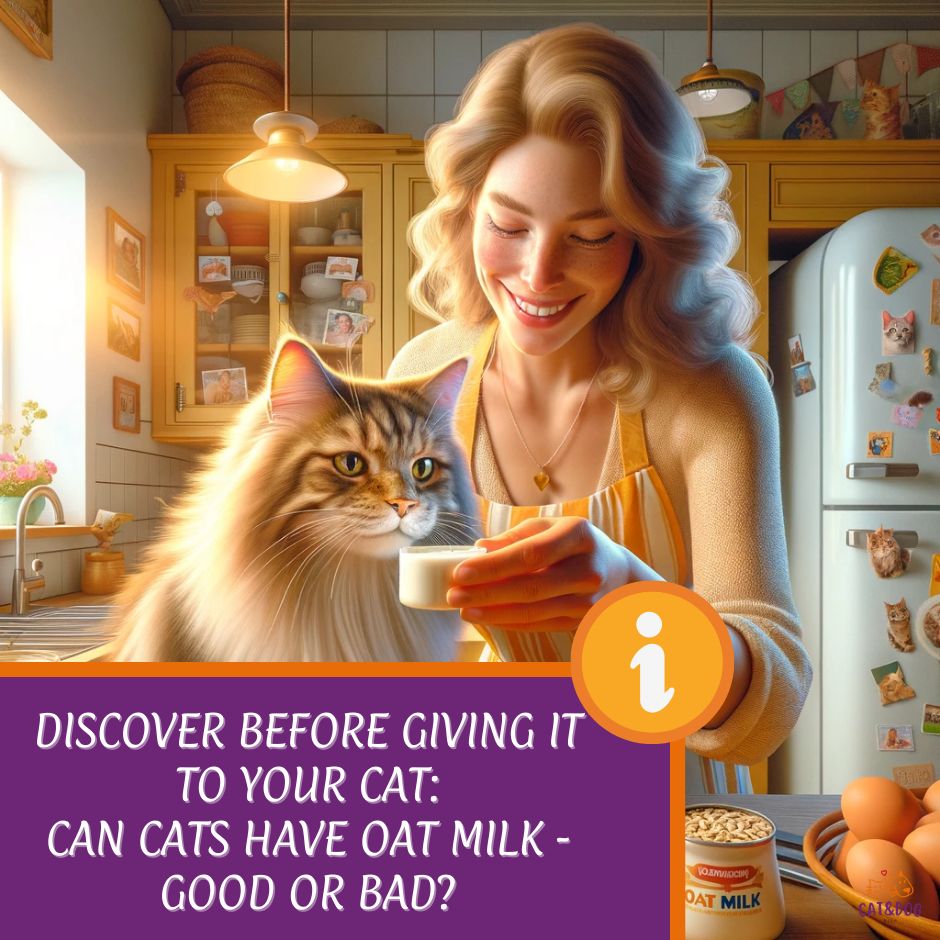As more people embrace non-dairy milk substitutes in their diets, a question arises: Can cats have oat milk?
This trend of considering plant-based alternatives isn’t just limited to human consumption; it extends to what our pets, particularly our cats, can safely enjoy.
With oat milk becoming increasingly popular in households, it’s natural to wonder if your feline friend can partake in this trend.
This curiosity is especially piqued by the whimsical posts from other cat owners on social media, who often share moments of treating their pets with a splash of their dairy-free milk.
The truth is, while oat milk is not inherently harmful to cats, it doesn’t cater to their nutritional needs. Cats are obligate carnivores, which means they require nutrients found predominantly in meat.
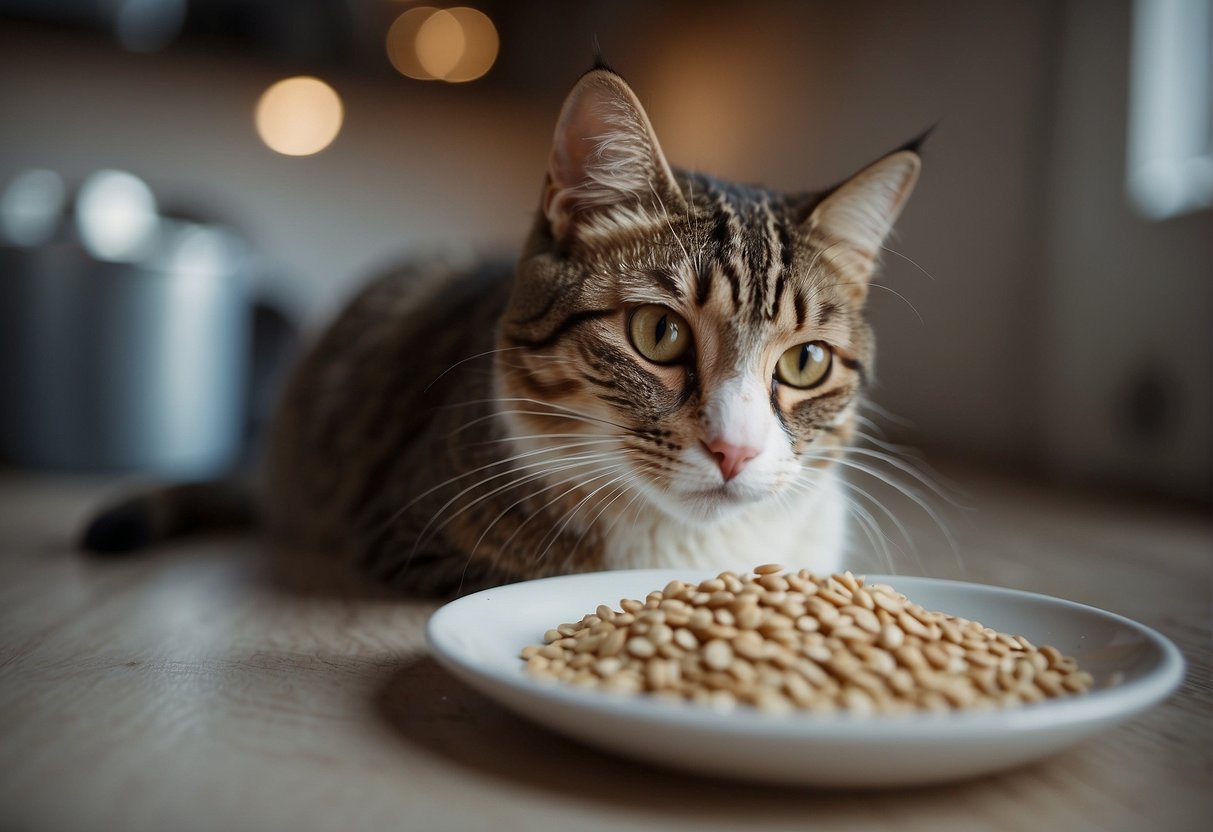
Therefore, the question isn’t so much about harm, but about benefit.
Including oat milk in your cat’s diet as a treat might make you feel like you’re sharing something special, but it’s not something they need for their health, so, choose the treat made for your cat’s health.
When browsing through those pet forums, you’ll likely find a mix of anecdotal stories, but it’s always best to base your decision on credible expert insights.
Key Takeaways
- Oat milk is not toxic to cats but is not a necessary addition to their diet.
- Cats are obligate carnivores and their nutritional needs are met primarily through meat-based proteins.
- While anecdotal evidence on non-dairy milk in cats’ diets exists online, expert guidance is essential for your cat’s health.
The Nutritional Needs of Cats
Hey there, cat lovers! Your kitty’s diet is more than just a bowl of munchies; it’s a sophisticated fuel that powers their nine lives!
Cats are obligate carnivores, which means they rely heavily on meat to obtain the right nutrients.
Unlike us humans who enjoy a bit of everything on our plates, cats are designed for a diet with high protein and low carbohydrates. Why? (1)
Because their little bodies are fine-tuned hunters with unique dietary needs.
The star nutrient for cats is taurine, an amino acid found abundantly in the muscle meat of animals. A deficiency in taurine? (2)
That’s a big no-no, it can cause serious health issues like heart problems and blindness. And since cats aren’t great at making this amino acid themselves, they look to their diet to stock up.
Now, let’s chat about enzymes – or the lack of them. Cats don’t have the enzymes needed to efficiently process plant-based nutrients. This means vegan diets just aren’t their jam.
Comparing Oat Milk with Cow’s Milk
| Nutrient | Oat Milk | Cow’s Milk |
|---|---|---|
| Protein | Low | High |
| Fat | Low-Medium | Medium-High |
| Carbohydrates | High | Low-Medium |
Looking at the table, you can see oat milk doesn’t quite fit the ‘meat-eater’s delight’ with its higher carbs and lower protein levels compared to traditional cow’s milk.
And here’s a fun fact: Did you know that a whopping lactose intolerance affects a large percentage of adult cats? (3)
That’s right! This intolerance can lead to all sorts of tummy troubles. Oat milk dodges the lactose bullet, making it easier on their belly than cow’s milk.
So, while oat milk may skip the lactose woes, it still misses the mark on meeting the carnivorous nutritional checklist for your whiskered companion.
Given cats’ lactose intolerance, oat milk presents a lactose-free alternative that could avoid the digestive discomfort associated with traditional dairy milk, making it a consideration for pet owners looking for milk substitutes.
Remember, your cat isn’t craving a latte; they’re on the prowl for a diet packed with all the meaty goods they need.
Keep those meals balanced, and you’ll have a purring, healthy cat sprawled out on your lap for many cat naps to come!
Detailed Analysis of Oat Milk’s Nutritional Content
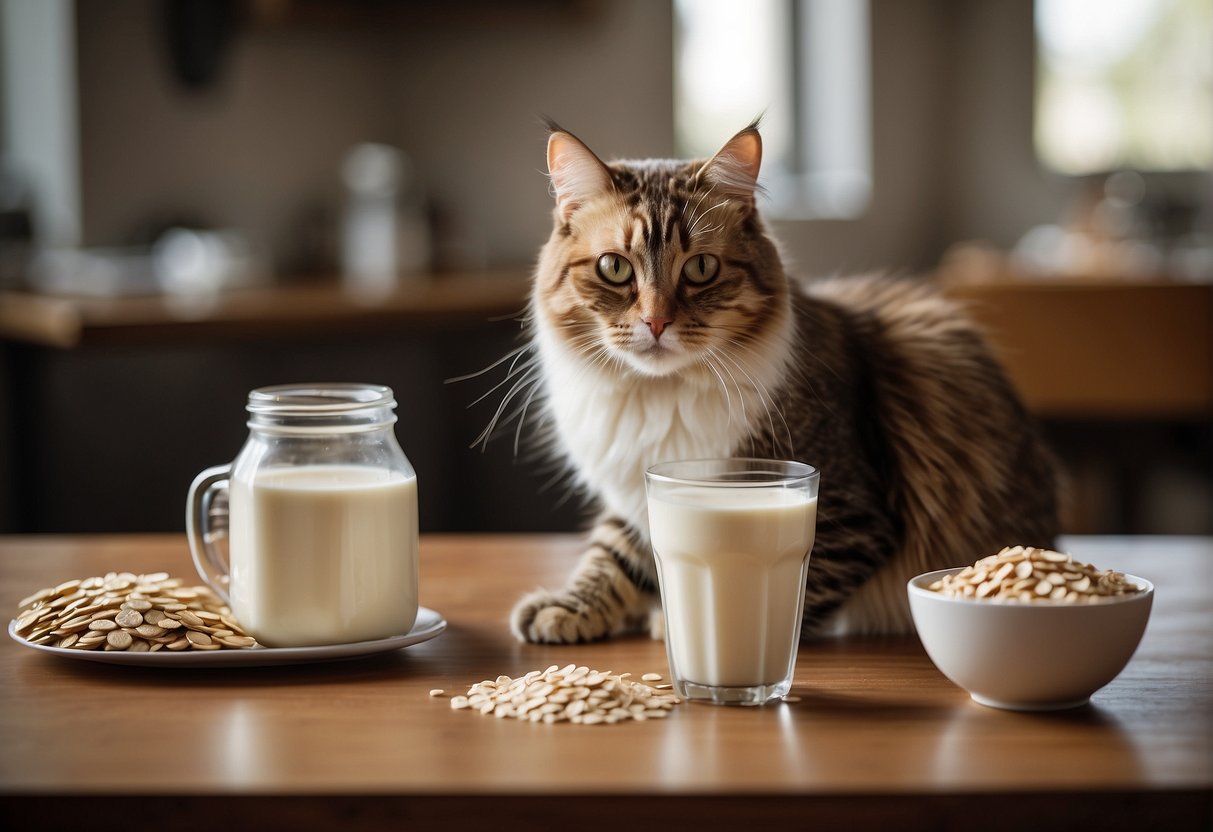
Let’s take a peek at the numbers and what they mean for your feline friend!
Vitamins & Minerals:
Oat milk is often supplemented with nutrients to rival those found in cow’s milk. A typical serving could provide:
- Calcium: Essential for bone health, around 350 mg per serving!
- Vitamins D and B12: For maintaining kitty’s energy levels and overall well-being. (4)
Fiber:
At about 2 grams per serving, the fiber content is notable. While not a cat’s dietary staple, it can aid in digestion.
Protein:
Surprise! Oat milk contains about 3 grams of protein per serving, but here’s the catch – it’s not the animal protein cats typically thrive on.
So, could this be a case of ‘right idea, wrong execution’ for our carnivorous companions?
Let me tell you a story about a specific brand of oat milk. In a university study, when this brand was offered to cats, researchers noted no significant health benefits.
Cats can technically handle a little oat milk, but does it do them any good? Not quite.
So, here’s the skinny: Oat milk lacks certain nutrients that cats would normally get from their meat-heavy diet.
It’s low in animal protein and doesn’t naturally contain taurine, an amino acid critical for cat health which must be sourced from their diet.
To wrap this up – if you’re thinking of oat milk as a treat, less is more. Ensure it’s free from additives, and remember, nothing beats water when it comes to hydration and health for your whiskered pal.
Keep those treats diverse, but balanced, and you’ll have one happy kitty!
Oat Milk: A Specific Focus for Cats
Have you ever wondered if your furry companion can share in your love for oat milk? Cats and oat milk, you ask? Let’s purr-use this topic.
If you’re considering oat milk as an alternative due to your cat’s dietary sensitivities or your own health beliefs, it’s important to sift through the facts.
Why Oat Milk?
Firstly, some cats may have allergies to cow’s milk. Since oat milk is dairy-free, it could be a gentle option. Plus, as health-conscious choices blossom, you might lean towards plant-based diets and wonder if your kitty can join in. (5)
Oat Milk vs. Other Milk Alternatives
| Milk Type | Protein | Calcium | Safety for Cats |
|---|---|---|---|
| Oat | Low | Fortified | Safe in moderation |
| Almond | Low | Fortified | Proceed with caution |
| Soy | Moderate | Fortified | Generally safe in moderation |
It’s a jungle out there with milk alternatives like almond or soy.
Though these are also low in protein compared to cow’s milk, almond milk can be tricky due to its nut content, which cats typically should avoid.
Nutrients Relevant to Cats
Oat milk has its perks; it’s often fortified with nutrients like calcium and vitamins. But remember, it’s not a kitty cocktail of all the essentials.
Cats are carnivores and thrive on protein, which oat milk lacks substantially.
Health Risks or Benefits
While it’s okay for your feline to lap up a little oat milk occasionally, too much of a good thing can lead to upset tummies.
Remember, balance is key, and moderation is the cat’s meow when it comes to treating your cat with oat milk.
So, there you have it! Keep your cat’s diet varied and consult with your vet before introducing new foods.
Here’s to happy, healthy kitties and informed, caring owners like you!
Credibility and Expert Insights
Before allowing your feline friend to sip away, it’s crucial to consider professional advice.
Veterinarian insights:
Dr. Sara Ochoa, a vet with expertise in feline health, indicates that while most cats are lactose intolerant and shouldn’t consume cow’s milk, oat milk can be a safer alternative.
However, moderation is key.
Importance of expert guidance:
When it comes to your kitty’s health, following the insights of vets and animal nutritionists keeps those purrs coming.
They’ve studied countless hours to understand what’s best for your cat’s unique dietary needs.
- Introducing Non-Dairy Milk:
If you’re thinking about adding oat milk to your cat’s diet, consider these tips:
- Start with small amounts to test how your cat tolerates it.
- Opt for unsweetened and unflavored oat milk to avoid unnecessary sugars.
- Start with small amounts to test how your cat tolerates it.
Animal nutritionist warnings:
Excess sugar can lead to overweight pets. A professional would nod to the idea that oat milk is no substitute for water or a well-balanced diet.
Expert Recommendations:
- Occasional Treat: An occasional splash of oat milk can be a delightful treat for most cats.
- Monitor: Keep an eye out for any adverse reactions when they first try oat milk.
Remember, it’s not just about what can your cat have, but what should they have for optimal health. Always check with your vet before jazzing up your cat’s menu.
It’s not about being a buzzkill—it’s about keeping those nine lives long and thriving!
Cat-Specific Dietary Considerations
Cats are obligate carnivores, meaning they require a diet high in protein that comes strictly from animal sources.
Your cat’s nutritional needs aren’t just a smaller version of a dog’s; they’re a different beast altogether!
While dogs can enjoy a more varied diet and can digest some plant-based nutrients, cats need specific nutrients that are only found in meat, like taurine and arachidonic acid. (6)
Taurine, for instance, is an essential amino acid that’s vital for a cat’s heart health and vision.
Here’s what a typical cat-centric menu might feature:
- Animal-based proteins (chicken, fish, or beef)
- Amino acids from animal sources
- Fats, also primarily from meat
And then there’s milk. Despite the classic image of a cat happily lapping up a bowl of milk, it’s a big no-no.
Cats often become lactose intolerant after weaning, which means most milk can upset their stomach. Oat milk?
It’s a safer bet as it’s lactose-free, but it’s not a nutritional necessity for cats and should be served sparingly.
Specialized cat diets could include:
- Prescription diets for health issues
- Life-stage diets (kitten, adult, senior)
- Limited-ingredient diets for sensitivities
If you’re thinking about supplements, cats on a well-balanced commercial diet typically don’t need them. The exception?
Specific health conditions where your vet may recommend supplements.
Remember, your cat is unique and their diet should be too. So, before introducing anything new like oat milk or a supplement, have a chat with your vet.
They’ll give you the scoop on what’s purr-fect for your feline friend!
Long-Term Effects and Comparative Analysis
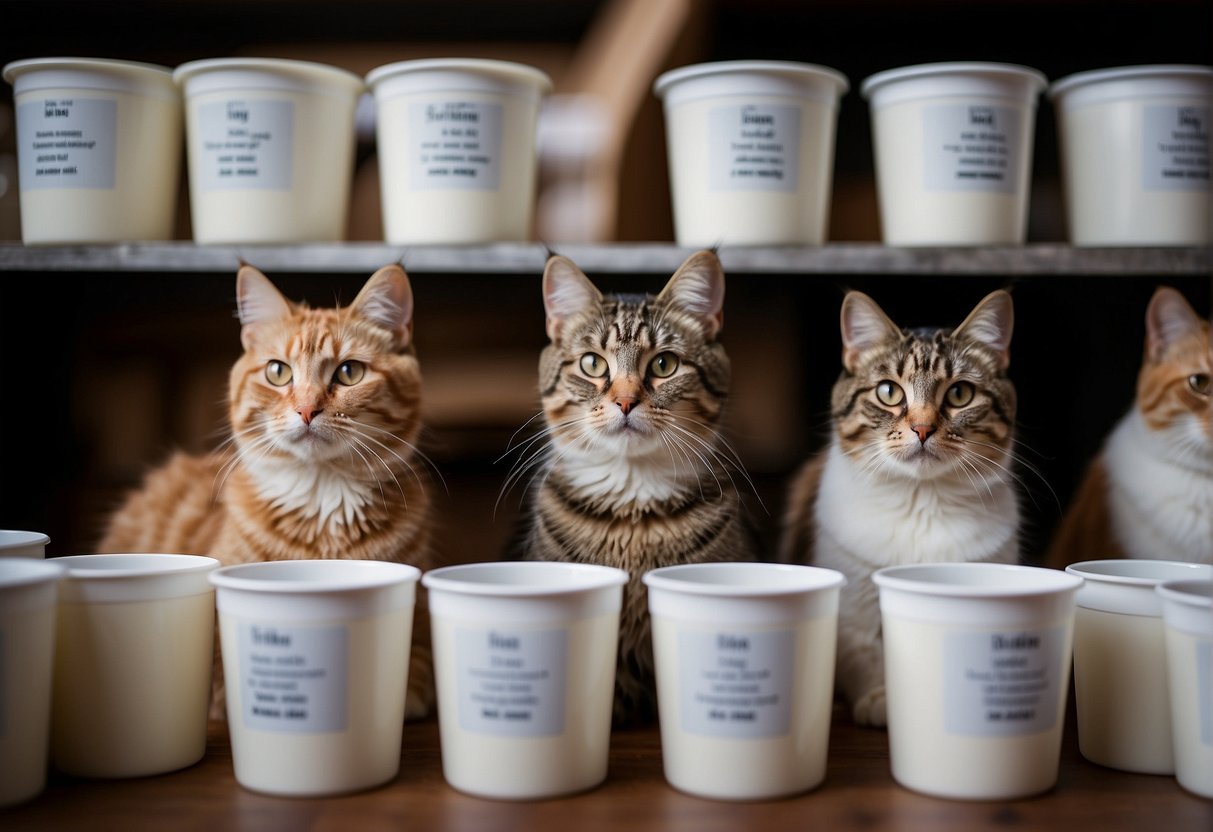
Let’s break down what the future might hold if oat milk becomes a regular in your cat’s diet.
Digestive Health:
Keeping your cat’s digestive system happy is key. Oats might be troublesome for your furry friend to break down, potentially leading to:
- Stomach upset
- Bloating
- Diarrhea
Imagine having a sore belly regularly. Not fun, right? Well, it’s the same for cats. Even though most felines don’t show it, long-term digestive discomfort can impact their health and mood.
Nutritional Imbalance:
Cats are obligate carnivores, requiring a meat-based diet.
Here’s a quick comparison for perspective:
| Nutrient | Cat’s Requirement | Oat Milk Content |
|---|---|---|
| Protein | High (Animal-based) | Lower (Plant-based) |
| Carbohydrates | Low | Higher |
| Additives | None | Present |
Continuous intake of oat milk could lead to nutritional imbalances, not supporting your cat’s carnivorous needs.
Case Studies and Data:
Rare, but anecdotes suggest cats do best with water and their regular diet.
Introducing oat milk as a significant part of their diet is like playing with the unknown – and it’s probably not worth the risk.
Keeping your cat’s intake of oat milk to a minimum, like a treat, might be the wiser option.
No studies have shown any ‘super-cat’ benefits from oat milk, and the potential for long-term digestive issues isn’t a myth.
Remember, what’s healthy for you isn’t always a yes for your pet. Your cat’s health over the years matters, so sticking to tried-and-true cat nutrition will keep those purrs coming.
If you’re in doubt, a chat with the vet can clear things up. Because really, who needs the extra worry?
Comparing Oat Milk with Other Alternatives
Let’s crunch some numbers and look into what experts say about giving cats oat milk compared to other options.
Oat Milk:
- Nutritional Content: Low in protein but typically enriched with vitamins and minerals.
- Calories: Moderate, but watch for added sugars.
- Lactose: None, a big plus for lactose-intolerant cats.
Almond Milk:
- Nutritional Content: Contains vitamins and minerals but usually lower in protein than oat milk.
- Calories: Often lower than oat milk, beneficial for weight management.
- Lactose: Lactose-free, making it safe for cats, in theory.
Soy Milk:
- Nutritional Content: Higher in protein, which might seem better but isn’t necessary for cats who get enough from their regular diet.
- Calories: Comparable to oat milk.
- Lactose: None, but some cats might be sensitive to soy.
Coconut Milk:
- Nutritional Content: High in saturated fats, which isn’t ideal for cats.
- Calories: Higher, so it’s a less desirable option for regular consumption.
- Lactose: None, yet the fat content raises concerns.
Here’s what you should know, combining professional insights and available research:
| Milk Alternative | Protein | Calories | Lactose | Ideal for Cats? |
|---|---|---|---|---|
| Oat Milk | Low | Moderate | None | In moderation |
| Almond Milk | Low | Low | None | In moderation |
| Soy Milk | High | Moderate | None | With caution |
| Coconut Milk | Low | High | None | Not recommended |
Cats are built for a high-protein, low-carb diet, and none of these milks naturally fit the bill. Studies haven’t shown a significant long-term health impact when cats occasionally consume these milks.
However, none should replace water or regular cat food due to the lack of essential nutrients cats require.
It’s not a ‘purrfect’ solution but generally better than giving cow’s milk.
Just remember, moderation is key, and it’s important to choose an unsweetened variety to prevent unnecessary spikes in your cat’s sugar intake.
Keep an eye on them afterwards; just like us, each cat may react differently to new foods!
Quick Recap
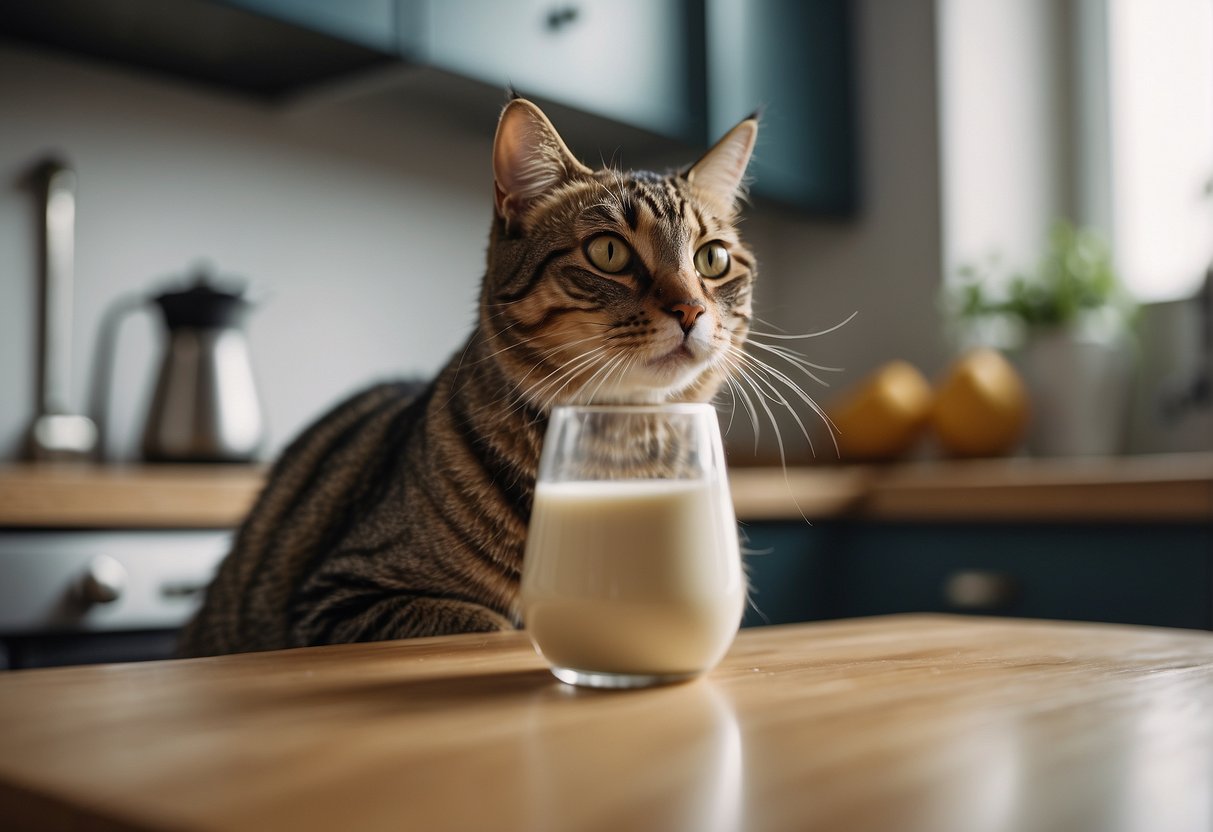
Can your fluffy buddy sip on some oat milk? Yes, they can! But let’s break it down to see if it’s a good idea.
- Safety First:
Oat milk is generally safe for cats. Just remember, it’s not a substitute for good ol’ water. - Watch the Additives:
Pick unsweetened and unflavored varieties. Vanilla oat milk? Tasty for you, but it’s got more sugar than your cat needs. - Lactose Intolerant? No worries! Oat milk is lactose-free, so sensitive stomachs can handle it better than cow’s milk.
How to Serve
- Moderation is Key: It’s an occasional treat, not a regular part of their diet.
- Quantity Matters: A small amount is enough to make sure they’re not overdoing it.
Friendly Reminders:
- Extra Calories? Unnecessary! Cats don’t need extra calories that can lead to weight gain.
- Fiber is Fabulous: High fiber content in oat milk is a digestive aid. But remember, they’re carnivores at heart!
Curious about quantities and specifics? A small dish, occasional sips, and always alongside their regular meals – that’s the way to go.
Keep these pet safety tips in mind, and you’ll ensure your cat’s treat time is both safe and enjoyable!
Frequently Asked Questions
Cats and oat milk, you’ve asked and we’ve listened. Discover the do’s and don’ts in this handy compilation of your burning questions.
Can oat milk be a regular part of my cat’s diet?
While you might love your daily oat milk latte, your cat’s diet should not regularly include oat milk.
Their nutritional needs are best met through high-quality cat food formulated for their specific dietary requirements.
Is oat milk safe for all cats?
Most cats can safely have small amounts of oat milk, but since every feline is unique, keep an eye out for any adverse reactions, particularly if your cat has a sensitive stomach.
How does oat milk compare nutritionally to cow’s milk for cats?
Oat milk tends to be lower in protein and calcium compared to cow’s milk and lacks the necessary nutrients that cats require.
Plus, some cats are lactose intolerant, making cow’s milk a poor choice for them.
Are there any specific brands of oat milk that are better for cats?
When it comes to oat milk for your cat, opt for plain, unsweetened varieties without added artificial ingredients, but remember, it’s only suitable as an occasional treat.
Can kittens have oat milk?
Kittens should primarily consume their mother’s milk or a kitten milk replacer.
Oat milk doesn’t provide the essential nutrients they need for growth and development.
How much oat milk can I safely give to my cat?
Moderation is key! Limit oat milk to the occasional treat, no more than a few tablespoons per week, to prevent digestive issues.
What are the signs of oat milk intolerance in cats?
If your cat experiences symptoms like diarrhea, vomiting, or an upset stomach after having oat milk, they may not tolerate it well.
Make sure to consult your vet if you notice any of these signs.

